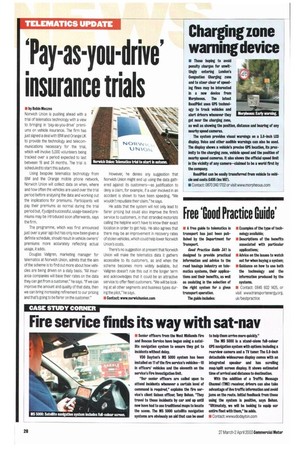'Pay-as-you-drive' insurance trials
Page 28

If you've noticed an error in this article please click here to report it so we can fix it.
• by Robin Meczes Norwich Union is pushing ahead with a trial of telematics technology with a view to bringing in 'pay-as-you-drive' premiums on vehicle insurance. The firm has just signed a deal with IBM and Orange UK to provide the technology and telecommunications necessary for the trial, which will involve 5,000 volunteers being tracked over a period expected to last between 18 and 24 months. The trial is scheduled to start this autumn, Using bespoke telematics technology from IBM and the Orange mobile phone network, Norwich Union will collect data on when, where and how often the vehicles are used over the trial period before analysing the data and working out the implications for premiums. Participants will pay their premiums as normal during the trial period but, if judged successful, usage-based premiums may be introduced soon afterwards, says the firm.
The programme, which was first announced just over a year ago but has only now been given a definite schedule, should result in vehicle owners' premiums more accurately reflecting actual usage, it adds.
Douglas Vallgren, marketing manager for telematics at Norwich Union, admits that the aim of the scheme is to find out more about how vehicles are being driven on a daily basis. "All insurance companies will base their rates on the data they can get from a customer," he says. "if we can improve the amount and quality of that data, then we can bring increasing refinement to our pricing and that's going to be fairer on the customer." However, he denies any s estion that Norwich Union might end up using the data gathered against its customers—as justification to deny a claim, for example, if a user involved in an accident is shown to have been speeding. 'We wouldn't repudiate their claim," he says.
He adds that the system will not only lead to fairer pricing but could also improve the firm's service to customers, in that stranded motorists calling the helpline won't have to know their exact location in order to get help. He also agrees that there may be an improvement in recovery rates of stolen vehicles, which could help lower Norwich Union's costs.
There's no suggestion at present that Norwich Union will make the telematics data it gathers accessible to its customers, as and when the scheme becomes more widely available, but Vallgren doesn't rule this out in the longer term and acknowledges that it could be an attractive service to offer fleet customers. "We will be looking at all other segments and business types during the pilot," he says.
• Contact: wvrvi.norwichunlon.com












































































































































































